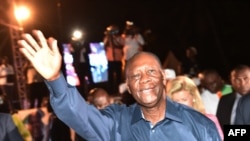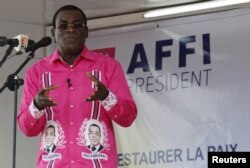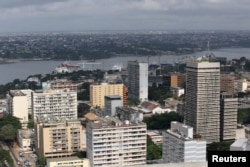Ivory Coast was praised by observers for holding "peaceful, transparent, and inclusive" elections last week, which resulted in the re-election of President Alassane Ouattara. The peaceful process was seen as an encouraging sign that the West African nation could finally put its violent past behind. But, the 73-year-old president still faces challenges as he begins his second five-year term.
Speaking to VOA's French-to-Africa reporter Tatiana Mossot earlier this week, newly re-elected Ouattara said he was a happy man. He had just won the presidential election, winning 83 percent of the vote and effectively achieving the "first-round knockout" that he said he was pursuing during his electoral campaign.
Ouattara said the results are exceptional, and that they show a great trust from the people in his policies and action.
Peaceful elections
Most of all, he said, elections were peaceful for the first time in 25 years. During the previous presidential election in 2010, clashes between supporters of then-President Laurent Gbagbo and his challenger, Ouattara, killed more than 3,000 people.
While they conceded defeat and congratulated him, his defeated challengers called for him to address the issue of reconciliation.
Ouattara's main challenger Pascal Affi N'Guessan said there were high rates of abstention in zones deeply affected by the 2010-2011 post-election crisis. He said it shows that people are still scared and it confirms that the country needs reconciliation and democracy.
Equal justice, key to reconciliation
Jim Wormington, West Africa researcher at Human Right Watch, says a key to this reconciliation is an equal justice.
"Perpetrators from both sides of the post-election crisis should be held to account, and Human Rights Watch and others found that abuses were committed not just by pro-Gbagbo forces but also by pro-Ouattara forces," he said.
Wormington also said the government should find a solution to the lasting land conflict in the west of the country, which drove conflicts in the past.
During his interview with VOA, Ouattara vowed to put social cohesion and equal justice at the center of his second mandate, but said it takes time.
Economic growth
The 73-year-old president also said economic growth will help reconciliation. During his first term, he focused on bringing the country's economy back on track. Production of the country's main export, cocoa, has recovered, and the economy has grown at an annual rate of nine percent over the last three years.
While his supporters praise him for building roads and bridges, others note that "one can't eat bridges".
The number is decreasing, but 46 percent of Ivorians still live in poverty, according to the World Bank. The government says it created two million jobs in the last four years alone, but unemployment is still high, especially among the youth.
The president believes his policies can improve that.
"Good economic policy and a good economic situation help reconciliation... We will continue to give emphasis on the private sector, because I am a liberal, I believe in liberal policies," he said. "Secondly, we want to get more efficiency in the public sector public investment. Doing all that, we'll get a very high rate of growth, to reduce the level of poverty. We were above 50 percent, we've reduced it by 10 percent, my objective is to reduce it by half for my next term, by 2020."
The electoral commission gave the provisional election results to Ivory Coast's constitutional court on Wednesday. The court has one week to review them and officially announce the final results.







